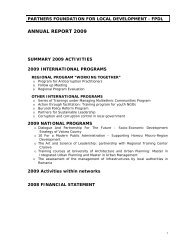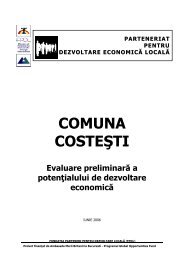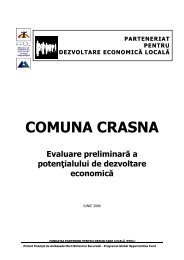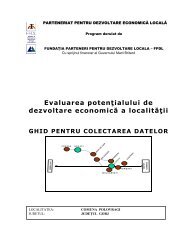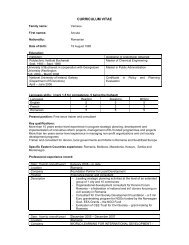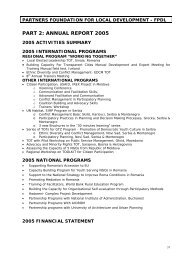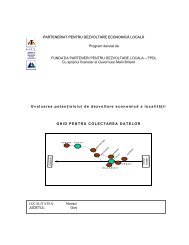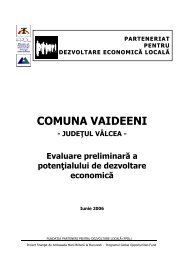Organizational Development: A Manual for Managers and ... - FPDL
Organizational Development: A Manual for Managers and ... - FPDL
Organizational Development: A Manual for Managers and ... - FPDL
Create successful ePaper yourself
Turn your PDF publications into a flip-book with our unique Google optimized e-Paper software.
Conflict<br />
It may happen, that not only one, but two or more interrelated subjects want to be heroes. Each<br />
one tends to <strong>for</strong>ce the other to align with him, but does not want to adjust himself. Both (or more)<br />
become harmful one to another, not because of differences in beliefs, values or interests, but just<br />
because of disagreement about the chosen method of behaviour. If one possesses much more<br />
power he/she may override the other (or others) <strong>for</strong> the period that this advantage remains. This<br />
may be <strong>for</strong> a long or a short time; then positions may change. Thus, instead of seeking to find a<br />
common solution <strong>and</strong> a ‘win-win’ situation, the subjects remain in opposing positions that may <strong>for</strong> a<br />
while create a ‘win-lose’ scenario, but in the long run almost always result in a ‘lose-lose’ situation.<br />
That is a conflict.<br />
Coordination<br />
The emergent effect of coordinated actions (or synergy effect) may bring to life an absolutely new<br />
quality - two men may be able to take a piano to the 5 th floor in ten minutes, which either one<br />
separately may never be able to do it. Or, it may accelerate the quantitative parameters - when<br />
three waiters serve all clients together, as a team, the service response time is usually about onetenth,<br />
because it is not necessary to wait <strong>for</strong> ‘your’ waiter.<br />
Subjects, taken together to a dangerous situation, may have no choice but to coordinate their<br />
actions or to not survive. Imagine an isl<strong>and</strong> with 100 barbarians - absolutely selfish, never<br />
communicating, each very similar in their abilities - all living separately, paying no attention to one<br />
another. That may be possible if the isl<strong>and</strong> produces food sufficient <strong>for</strong> 100. But if the climate<br />
changes, <strong>and</strong> there is only enough food <strong>for</strong> 80 species to survive – they may all die, because this<br />
resource will distribute more or less equally among them, which means everyone will be able to<br />
find about 80 percent of what is needed. That would be the paradox of full freedom. Nature would<br />
never allow this. Sooner or later, two or three of the barbarians, being extremely selfish <strong>and</strong> very<br />
ill-mannered, would decide to come together to search food <strong>and</strong> share the spoils, to protect each<br />
other from outside aggression, or even attack the other barbarians. Now these three will definitely<br />
survive. There are a lot of resources around. Others may decide do the same – <strong>and</strong> also survive,<br />
but not all of them; there will be losers - those who are feeble, or were too late in grouping with<br />
others.<br />
Thus, those who cooperate, up to a maximum of 80, may survive. But not <strong>for</strong> free. Though being<br />
inherently selfish <strong>and</strong> striving exclusively <strong>for</strong> their own interests, they must limit themselves to the<br />
scope of behaviours that is agreed upon <strong>and</strong> accepted by others. This requires seeing others,<br />
communicating with others, taking others into account – this may be very oppressive in the<br />
64




